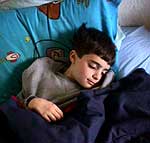 | Sleep and Dreaming Experiments |  |
| You may not have thought about it, but people sure sleep a lot. Imagine...if on the average, people sleep 8 hours a day, they are sleeping away 1/3 of their life. How much is that? Well, 8 hours of sleep every day is the same as 233,600 hours of sleep by the time you are 80 years old. That's the same as sleeping 26.67 years!!! We also dream about 4-5 times a night: that is the same as 116,800 to 146,000 dreams by the time you are 80 years old!!! | ||
Watch BrainWorks: Sleep and the BrainFor grades 3-12
|
Activity 1: Keep a "SLOG" (Sleep Log)For grades 3-12

|

Activity 2: Be an REM DetectiveFor grades 3-12
Practice observing this in someone who is awake. Just ask the person to close his or her eyes and then to move their eyes. You should be able to see a bulge moving behind the eyelid quite easily. Now you are ready to do some sleep research. When your brother or sister or mother or father is sleeping, take a peek at their eyes. Are their eyes moving back and forth rapidly? If they are, the person is probably in REM sleep. Remember that there are only about 4-5 REM periods in a whole night's sleep, so you might miss it.
|

Activity 3: Drop off or Drift off?For grades 6-12Most people do not gradually "drift off" to sleep. Rather, the change from being awake to being asleep is very quick. It is similar to switching off a light. To investigate if this is true for you, turn on a TV or radio as you are going to sleep. Keep the volume low. When you wake up, ask yourself if the TV or radio gradually faded out or if suddenly, everything just went blank. What was the last thing you can remember before you fell asleep? |

Activity 4: Sleep LatencyFor grades 6-12Exactly how long does it take you to fall asleep? Dr. William C. Dement in his book, The Promise of Sleep (1999), describes one way to measure the time it takes to fall asleep. Write down the time you get into bed. When you are in bed trying to get to sleep, hold a metal spoon over a plate on the floor. When you fall asleep, your muscles will relax and the spoon will fall out of your hand. The noise of the spoon hitting the plate should wake you up. Write down the time you woke up. The difference between the time you got into bed and time you woke up is your sleep latency. If the spoon misses the plate, you may not wake up. You could substitute a large metal cookie sheet if this happens.
|

|
Did you
know? | Thomas Edison, the famous inventor, thought that sleep was a waste of time. He is reported to have said, "Sleep is an acquired habit. Cells don't sleep. Fish swim in the water all night. Even a horse doesn't sleep. A man doesn't need any sleep." Isaac Asimov, the science fiction writer, also did not like sleep. He said, "I never use an alarm clock. I can hardly wait until five a.m. In the army I always woke before reveille. I hate sleeping. It wastes time." |
| GO TO: | Explore the Nervous System | Experiments and Activities | Table of Contents |
![[email]](./gif/menue.gif) Send E-mail |
![[newsletter]](./gif/menunew.gif) Get Newsletter |
![[search]](./gif/menusea.gif) Search Pages |
 Donate to Neuroscience for Kids |
 Print out this
Print out this 
 Some questions to keep in mind:
Some questions to keep in mind: If you have read about
If you have read about  Materials:
Materials:
 Be quiet and do not
to wake up the person. Otherwise, you might have a very angry test
subject!
Be quiet and do not
to wake up the person. Otherwise, you might have a very angry test
subject!